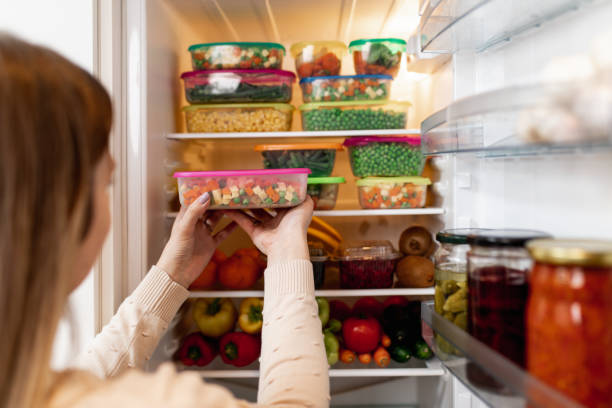Is it bad to eat mostly frozen fruits and vegetables?
Is it bad to eat frozen fruit everyday? Frozen fruits and vegetables are still normally chosen at their ripest and rapidly frozen, maintaining their nutritional worth, so eating them can still be a good decision. In contrast to ingesting fresh food, relying only on frozen fruits and vegetables may have several disadvantages. Here are some things to think about:

While freezing helps many nutrients stay intact, it can also cause heat-sensitive vitamins and enzymes to lose some of their potency. However, there is typically little nutritional difference between fresh and frozen vegetables.
Taste and texture: When fruits and vegetables are frozen, their texture can change, becoming softer or slightly mushy. Some folks might appreciate the crisp and hard texture of fresh food. Taste can also change slightly.
Variety and accessibility: Seasonal options abound with fresh vegetables, offering a wide range of flavours and nutrients. Using only frozen fruits and vegetables could reduce your exposure to other produce varieties.
Some frozen fruits and vegetables may include additional components, such as flavourings or preservatives. When buying frozen foods, it’s important to read the ingredient list and choose ones with few or no additives.
Benefits of eating frozen fruits
Fruits that are frozen might offer a number of advantages. The following are some benefits of consuming frozen fruit:
Fruits that are frozen are frequently selected at the height of ripeness and frozen promptly, helping to retain their nutritional value. Fruits can be frozen to preserve their valuable vitamins, minerals, and antioxidants, ensuring that you continue to obtain these health benefits when you eat them.
Convenience and Availability: Regardless of the fruit’s natural growth season, frozen fruits are always available. Because of this accessibility, it is simpler to include a variety of fruits in your diet all year round. Frozen fruits are a practical choice for quick and simple snacking or for adding to recipes because they are pre-washed, pre-cut, and don’t need to be peeled.
Longer Shelf Life: Because frozen fruit does not decay as quickly as fresh fruit, it has a longer shelf life. This can help you waste less food and maintain a supply of fruits on hand without having to worry about them spoiling.
Texture and flavour: Fruits that have a high water content, such as berries and melons, can benefit from freezing in order to preserve their texture. This can be very delicious when using them as toppings for desserts, yoghurt, or smoothies. Additionally, frozen fruit may have a modest sweetness boost due to freezing’s ability to increase fruit’s, inherent sweetness.

Fruits that have been frozen can be used in a variety of ways. They can be used as toppings for yoghurt, cereal, oatmeal and juice as well as added to baked products like muffins and pies. You can also add them to smoothies, juices and shakes. You can experiment with various recipes and take advantage of the health advantages of fruits in various forms thanks to the adaptability of frozen fruits.
Cost-Effectiveness: When buying out-of-season fruits, frozen fruit might occasionally be more affordable than fresh fruit. Frozen fruit is frequently less expensive than its fresh equivalents, making it a cost-effective option.
Can you eat frozen fruit without defrosting it?
Yes, You can consume frozen fruit without first defrosting it. Many people find it handy and refreshing to consume frozen fruit as a snack or to incorporate it into smoothies and sweets. Frozen fruit can be enjoyed directly from the freezer.
On very hot days, eating frozen fruit straight from the freezer can be a refreshing and delightful treat. Berries (such as strawberries, blueberries, and raspberries), grapes, mango chunks, and pineapple are among popular frozen fruits that are frequently eaten without defrosting.

Remember that compared to fresh fruit, the texture of frozen fruit will be stiffer and crunchier. Additionally, if the fruit is frozen, the flavour can be a little bit diminished. Fruit’s nutritional content is preserved by freezing, so you may still take advantage of the fruit’s vitamins, minerals, and antioxidants.
You can defrost frozen fruit by leaving it at room temperature for a brief length of time or by using the defrost feature on a microwave if you want a softer texture or wish to utilise the frozen fruit in cooking or baking. However, there is no need to defrost frozen fruit if you like the crispness and convenience of eating it right away.
What is the effect of always eating frozen food?
Depending on a number of variables, including the product’s nutritional composition, storage conditions, and the consumer’s general diet and lifestyle, eating frozen food can have both favourable and unfavourable impacts.
Not all frozen foods are made equally, it should be noted. When compared to excessively processed frozen meals, choosing complete foods like frozen fruits, veggies, and unprocessed meats can offer healthier alternatives. To maintain food safety and quality, it’s also critical to follow proper cooking and storage recommendations.
How harmful is eating frozen food once a day?
It’s not necessarily unhealthy to eat frozen food once a day, but it’s vital to think about the nutritional value and quality of the frozen meals you eat. The nutritional content and components of frozen foods might vary substantially.
To enhance flavour and lengthen shelf life, frozen meals frequently include preservatives, extra sweeteners, and high quantities of sodium. If ingested in excess, these additives might have harmful effects on health. Furthermore, some frozen meals could be deficient in important nutrients or contain harmful fats.

Your nutritional intake may become unbalanced if frozen meals make up the majority of your diet. A varied and balanced diet that includes fresh fruits, vegetables, whole grains, and lean proteins is generally advised. In comparison to their frozen equivalents, fresh foods frequently retain more nutrients.
Look for products that prioritise whole, natural ingredients, restrict added sugars, and lower sodium content to make frozen dinners a better alternative. It’s also advantageous to add fresh produce, nutrient-dense foods, and other foods to your frozen meals.
Is it OK to eat frozen vegetables and meat all the time?
Although eating frozen vegetables and meals might be a time-saving and wholesome alternative, it’s usually advised to have a varied and balanced diet. Even while frozen vegetables still have a lot of nutritious value, it’s still a good idea to include a variety of fresh fruits and vegetables in your meals whenever you can.
Depending on the ingredients and cooking techniques used, frozen dinners can have a range of nutritional values. While some frozen meals are designed to offer a balanced diet with a combination of proteins, carbs, and veggies, others could be higher in sodium, bad fats, or added sugars. It’s critical to read the labels and pick frozen meals that have a decent balance of nutrients and fewer dangerous additives.
Furthermore, sticking exclusively to frozen food may reduce the variety of tastes and textures in your diet. Fresh foods can have a larger variety of flavours and offer extra nutrients and enzymes that frozen equivalents might not have.
Conclusion
Include a variety of fresh, frozen, and even canned fruits and vegetables in your meals to maintain a well-balanced diet. This enables you to reap the advantages of various forms while guaranteeing a varied intake of nutrients. To achieve your nutritional demands, keep in mind to focus on overall dietary variety, which includes various food groups.
In conclusion, eating frozen food once a day might be a practical choice, but choosing nutrient-dense options and balancing them with fresh, whole meals is crucial for a balanced diet.
